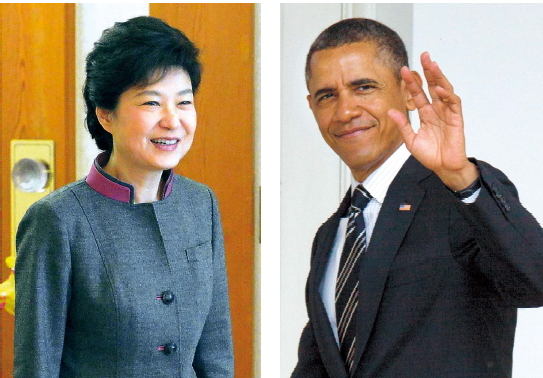Park’s first U.S. trip has packed agenda
North Korea, regional cooperation, ‘Buy Korea’ to take center stage
By Korea HeraldPublished : May 5, 2013 - 20:18
President Park Geun-hye left for the U.S. on her first overseas trip as president Sunday, accompanied by more than 100 aides and bureaucrats and one of the country’s largest-ever business delegations, to discuss North Korea, regional cooperation and investment in Korea.
The official working visit is expected to be compact but colorful, as Park will hop from New York to Washington to Los Angeles in less than a week, to meet U.S. President Barack Obama, U.N. Secretary-General Ban Ki-moon, American business leaders and Korean-Americans, as well as delivering a speech before Congress.
The six-day visit by the South Korean president reflects Seoul’s commitment to its ally of 60 years, with heightened expectations to alleviate tension on the Korean Peninsula and ease U.S. investors’ security-related doubts about the South Korean market.
Park’s official international debut comes amid tumultuous inter-Korean relations marred by North Korean threats that led to the suspension of Gaeseong industrial complex, the last remaining joint cooperation project.
It is most likely that Park and Obama, in their first official encounter, will want to set aside the details of sensitive bilateral agenda such as pending negotiations on defense cost sharing and a nuclear energy accord. Instead, the two will likely flaunt their “newfound” friendship and determination to carry on the alliance that has become even more crucial at a time of escalating nuclear threats from North Korea and flux among the regional players in Northeast Asia.
The official working visit is expected to be compact but colorful, as Park will hop from New York to Washington to Los Angeles in less than a week, to meet U.S. President Barack Obama, U.N. Secretary-General Ban Ki-moon, American business leaders and Korean-Americans, as well as delivering a speech before Congress.
The six-day visit by the South Korean president reflects Seoul’s commitment to its ally of 60 years, with heightened expectations to alleviate tension on the Korean Peninsula and ease U.S. investors’ security-related doubts about the South Korean market.
Park’s official international debut comes amid tumultuous inter-Korean relations marred by North Korean threats that led to the suspension of Gaeseong industrial complex, the last remaining joint cooperation project.
It is most likely that Park and Obama, in their first official encounter, will want to set aside the details of sensitive bilateral agenda such as pending negotiations on defense cost sharing and a nuclear energy accord. Instead, the two will likely flaunt their “newfound” friendship and determination to carry on the alliance that has become even more crucial at a time of escalating nuclear threats from North Korea and flux among the regional players in Northeast Asia.

For South Korea, the meeting is an opportunity to brief the U.S. on its new security vision, namely Park’s trustpolitik process that is yet to see the light of day, and her Northeast Asia peace and cooperation initiative. Seoul will also be able to lay out its plan to encourage trilateral strategic dialogue with Washington and Beijing. These and other agenda may be expounded on in Park’s speeches before both houses of Congress in Washington, D.C.
Park must also persuade critics at home that the emphasis on the Seoul-Washington alliance is not just an iterative commitment, but a future-oriented and detail-attentive strategy to bolster their approach to the North Korean regime.
The initial encounter between the Seoul and Washington governments, called “disappointing” by some observers, upon the visit of U.S. Secretary of State John Kerry last month exposed gaps between the allies, including their differing nuances in urging North Korea to come to dialogue. Critics said that while the U.S. had been neglecting its North Korea strategy, the South allowed hot-blooded domestic politics to eclipse a far-sighted approach to solving the North Korean nuclear issue.
Realigning their national interests for the next 60 years of Seoul and Washington’s alliance is also crucial, as the U.S. pursues its “pivot to Asia” policy while the South struggles to find its place among ambitious regional powerhouses including China.
“While there is talk in Korea that there should be strategic discussion among the South, the U.S. and China to deal with the North Korea problem, it should be preceded by extensive communication. ... It is most likely that, while the two presidents could mention in broad terms their commitment to regional cooperation, it would be difficult for (the endorsement of three-way cooperation) to be included in the joint statement,” said political science professor Nam Chang-hee of Inha University. He added that Seoul making any half-baked push for three-way cooperation without discussion on the alliance’s stance on the security of East Asia might not be well received by Washington.
The Park government has been accelerating its diplomatic steps to cultivate cooperation among U.S. and China, in the belief that U.S. and Chinese assistance is crucial to its trust-building process and peace in Northeast Asia.
Foreign Minister Yun Byung-se, for instance, has recently been vocal about the importance of the three-way cooperation in his meetings with U.S. and Chinese counterparts.
The vision for Korea-U.S.-China cooperation has received more of the spotlight as Japan continues to make controversial gestures and remarks about its history with Korea and China, much to the unease of the U.S.
The South Korean National Assembly recently passed a resolution denouncing Japan’s latest moves denying its pre-1945 wartime atrocities and Japanese Cabinet ministers’ visits to a controversial war shrine. South Korea’s Foreign Minister Yun Byung-se canceled a planned trip to Tokyo in protest.
As for Washington’s stance on South Korea-U.S.-Japan cooperation, Nam referred to recent remarks by U.S. Chairman of the Joint Chiefs of Staff General Martin Dempsey. He told the American Forces Press Service that a combined system linking the ground-based, aerial and maritime assets of all three nations would be better than the sum of its individual parts.
“While it is a possibility for the summit to discuss the cooperation, it may not be so suitable considering the latest outbreak of historical confrontation between Korea and Japan,” Nam said.
Also of note for Park’s U.S. visit is the size of the economic delegation that will be accompanying the president.
According to sources and reports, such leading chaebol group owners as Samsung Group chairman Lee Kun-hee, Hyundai Motor Group chairman Chung Mong-koo, LG Group chairman Koo Bon-moo as well as heads of the five major business associations are to join Park in the U.S. Lee is accompanying a president for the first time since September 2004, when he joined late President Roh Moo-hyun in Kazakhstan and Russia.
Leaders in the financial sectors, such as Shinhan Financial Group chairman Han Dong-woo, Hana Financial chairman Kim Jung-tae, KDB Financial Group Co. chief Hong Ki-taek and Korea Federation of Banks chairman Bahk Byong-won, and representatives of mid-sized and venture businesses are also said to accompany the president.
They are expected to help add weight to the conservative president’s first overseas trip, as well as highlight Korea’s new drive for a “creative economy” and encourage South Korea as a sturdy investment destination capable of withstanding the North Korea risk.
The delegation, at 50-something people, is large compared to the 20- to 30-strong team that had accompanied former President Lee Myung-bak.
The business leaders are expected to join Park in a roundtable hosted by the U.S. Chamber of Commerce. This is also expected to be an opportunity for the conglomerates to “break the ice” with Park, who was elected last December on the promise of economic democratization that had put large businesses on edge.
Park is also expected to take time to thank Korean-Americans and Korean residents in the U.S. at dinners to be held in the three cities.
By Lee Joo-hee (jhl@heraldcorp.com)
-
Articles by Korea Herald









![[Graphic News] More Koreans say they plan long-distance trips this year](http://res.heraldm.com/phpwas/restmb_idxmake.php?idx=644&simg=/content/image/2024/04/17/20240417050828_0.gif&u=)
![[KH Explains] Hyundai's full hybrid edge to pay off amid slow transition to pure EVs](http://res.heraldm.com/phpwas/restmb_idxmake.php?idx=644&simg=/content/image/2024/04/18/20240418050645_0.jpg&u=20240419100350)







![[KH Explains] Hyundai's full hybrid edge to pay off amid slow transition to pure EVs](http://res.heraldm.com/phpwas/restmb_idxmake.php?idx=652&simg=/content/image/2024/04/18/20240418050645_0.jpg&u=20240419100350)

